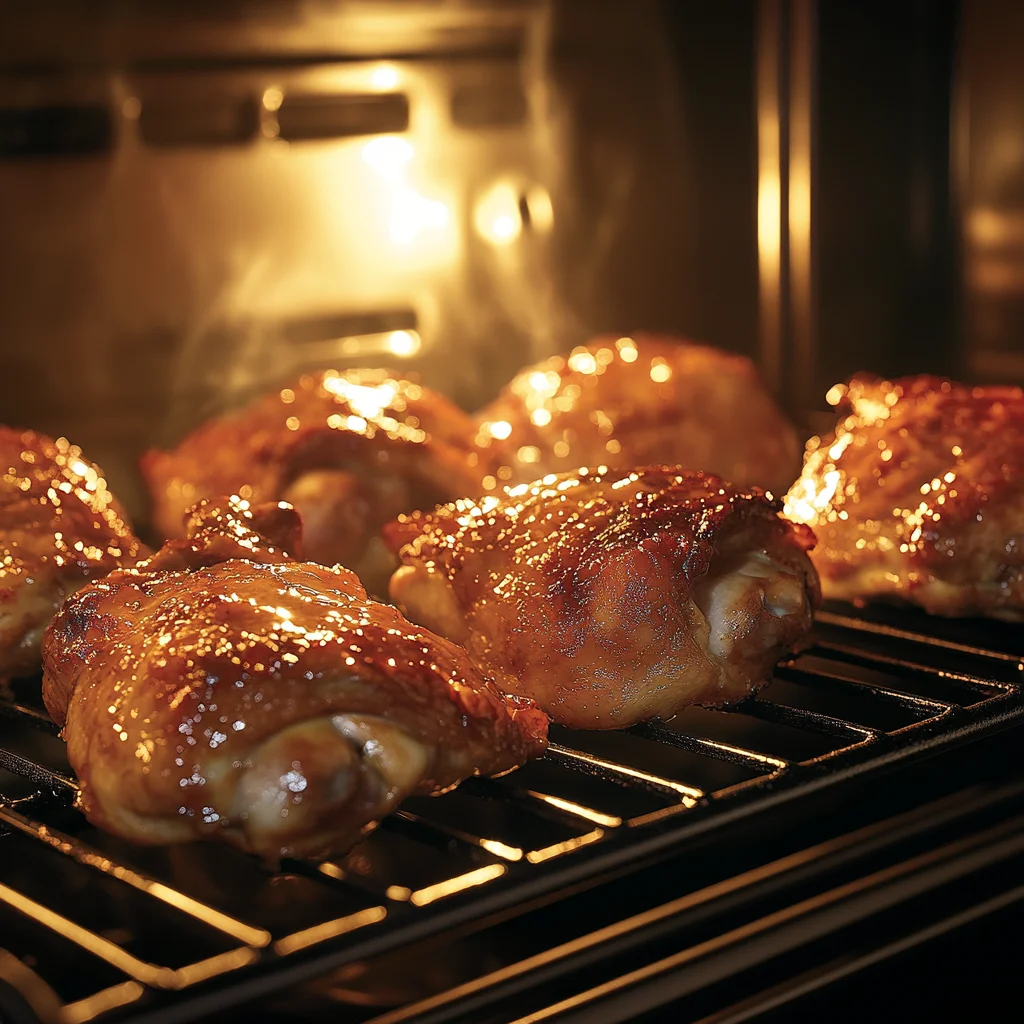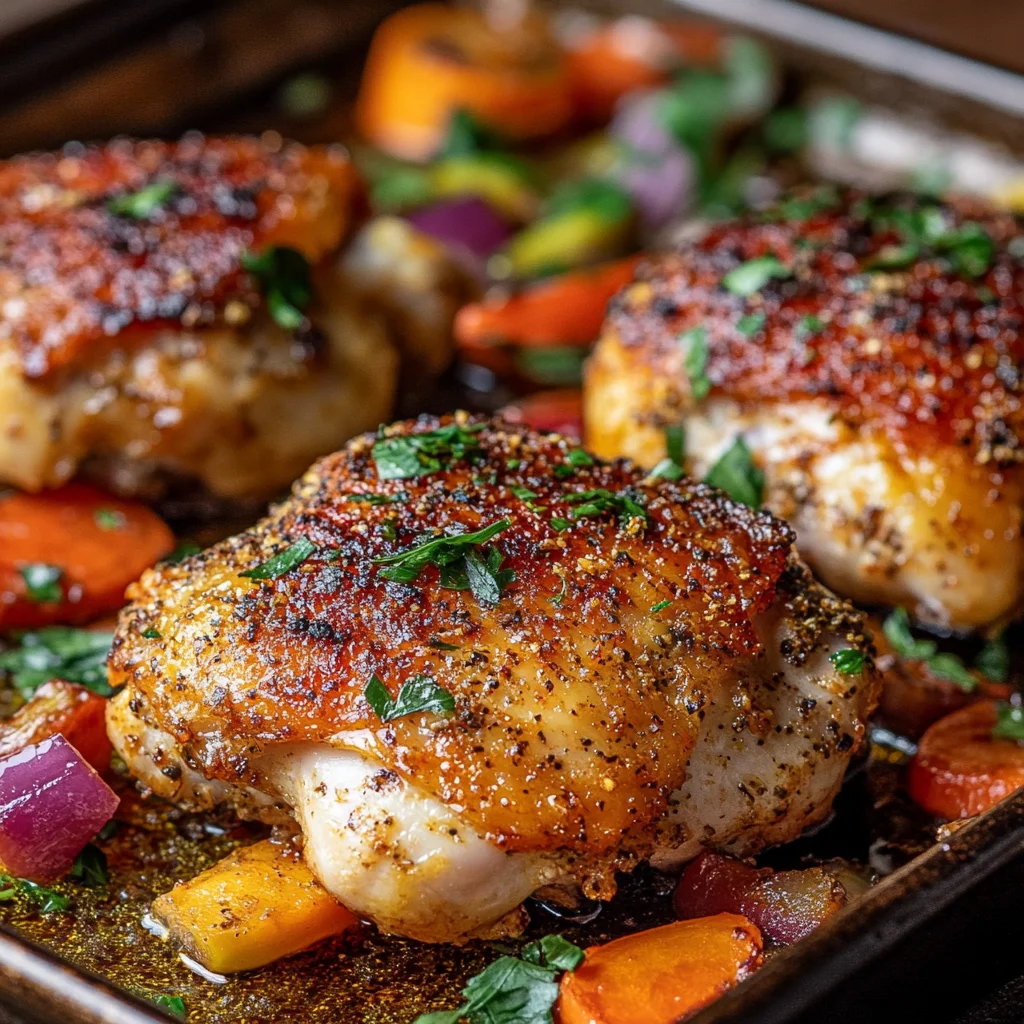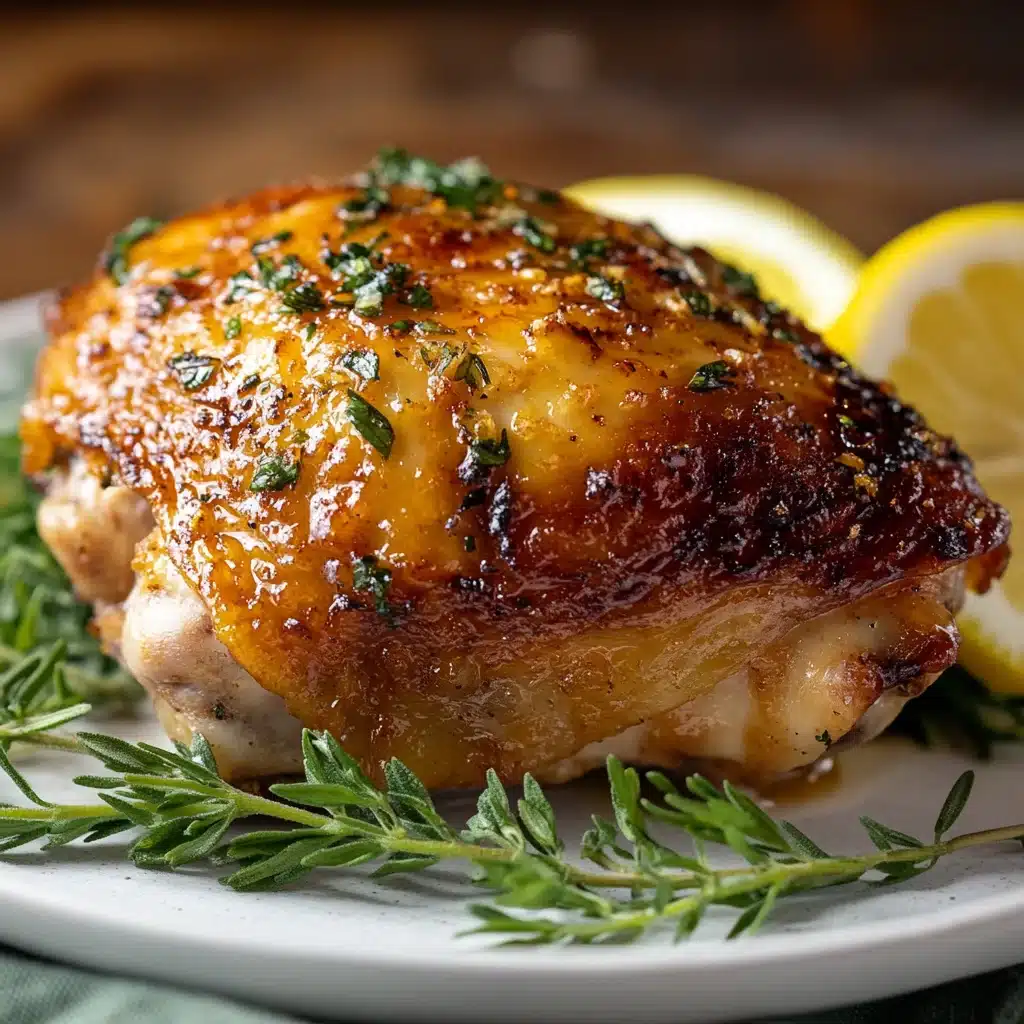When cooking chicken thighs, many home cooks often wonder, “Is it better to bake or broil chicken thighs?” The debate between baking and broiling chicken thighs is ongoing, with each method offering distinct advantages. Whether you’re looking for crispy skin or tender, juicy meat, the answer to “Is it better to bake or broil chicken thighs?” depends on your preferences and the time you have. In this guide, we’ll explore the differences, benefits, and expert tips to help you decide which method is best for preparing your chicken thighs.
Table of contents
Key Takeaways:
- Baking and broiling chicken thighs each offer distinct advantages regarding cooking time, heat distribution, and the equipment required. Baked chicken thighs are known for their tender, juicy texture, while broiled chicken thighs are famous for their crispy skin and enhanced flavor.
- Proper temperature control, seasoning techniques, and cooking times are crucial for the perfect baked or broiled chicken thighs.
- Both methods offer unique nutritional benefits, making it essential to consider your health and dietary needs when choosing between baking and broiling.
- Understanding common mistakes and mastering the art of each cooking technique can lead to consistently delicious chicken thigh dishes.
Bake or Broil Chicken Thighs: Key Differences Explained
When deciding is it better to bake or broil chicken thighs, it’s important to understand the difference between these two methods. Baking chicken thighs involves surrounding them with heat in the oven, ensuring even cooking. Broiling chicken thighs, on the other hand, applies high heat directly from above, which creates a crisp exterior and juicy interior.
Temperature and Heat Distribution

Baking chicken thighs involves placing them in a preheated oven, where the heat surrounds the food evenly from all sides. This method ensures thorough and consistent cooking. On the other hand, broiling chicken thighs relies on direct, intense heat from above, which sears the chicken’s exterior quickly, giving it a crisp, golden finish. Broiling chicken thighs uses direct, high heat from above, and this method soon sears the chicken’s outside.
Cooking Time and Heat: How Baking and Broiling Differ for Chicken Thighs
Baked chicken thighs take longer to cook, usually 30 to 45 minutes, depending on the size and thickness of the chicken. Broiled chicken thighs cook faster, in about 15 to 20 minutes. This makes broiling great for quick weeknight meals.
Equipment Requirements
To bake chicken thighs, you need a standard oven. But when broiling chicken thighs, a broiler and specific oven parts are required. Is it better to bake or broil chicken thighs based on your kitchen tools? If you have a broiler, broiling might be the best option for a quick and easy meal.
Knowing the differences between baking and broiling helps you pick the correct method. You can choose based on the crispy exterior, time, or flavor you want.
The Benefits of Baking Chicken Thighs (Bake or Broil Chicken Thighs

Baking chicken thighs offers many advantages. Is it better to bake or broil chicken thighs? If you are after tender, juicy meat, baking ensures even heat distribution, allowing the chicken to retain its moisture. Baking also allows for versatile seasoning and flavoring options, making it an ideal method for those who love experimenting with different herbs and spices.
One big plus is how evenly the heat cooks the chicken. This makes the meat tender and juicy chicken meat that tastes great. The slow cooking in the oven keeps the healthy protein in and stops it from drying out.
Baking also lets you try many different flavors. You can season the chicken in countless ways, making baked chicken thighs an excellent base for many tasty dishes.
Another benefit is the consistent results you get. This makes it easy to make your favorite meals over and over. It’s perfect for those who want to improve their cooking and impress others.
| Benefit | Description |
|---|---|
| Even Cooking | The controlled oven environment ensures the chicken thighs are cooked through evenly, resulting in tender, juicy meat. |
| Moisture Retention | Baking allows the chicken to cook slowly, locking in the natural flavors and moisture for a more delicious outcome. |
| Versatility | Chicken thighs can be seasoned and prepared in a variety of ways, making them a versatile protein for numerous recipes. |
| Consistent Results | The predictable nature of baking chicken thighs makes it easier to replicate your favorite dishes with reliable outcomes. |
In conclusion, baking chicken thighs is an excellent option for many reasons. It ensures even cooking, helps keep the meat moist, and is highly versatile. These benefits make it a top choice for preparing delicious, healthy, and protein-rich meals.
Why Choose Broiled Chicken Thighs for Your Meals (Bake or Broil Chicken Thighs
If you love crispy chicken skin and quick meals, broiling might be the better option for you. When considering is it better to bake or broil chicken thighs, broiling wins in speed and crispiness. The intense heat from above ensures the skin crisps up beautifully, while the interior stays moist.
Why Broiling Chicken Thighs Results in Crispier Skin
The broiler’s dry heat is key to crispy chicken skin. The fat under the skin melts as the chicken cooks, making the outside crispy and the inside juicy.
Speed and Convenience
Broiling chicken thighs is fast and easy. It’s perfect for when you’re in a hurry. The broiler’s heat cooks the chicken faster than baking, saving you time.
Flavor Enhancement
Broiling also brings out the chicken’s natural flavors. The heat caramelizes the sugars, adding depth to the taste. Whether marinated or seasoned, broiling enhances the flavor, making for a memorable meal.
Try broiled chicken thighs for a crispy, flavorful meal. It’s a quick and delicious way to enjoy tasty poultry dishes at home.
Essential Tips for Perfect Baked Chicken Thighs
Making perfectly baked chicken thighs is an art. It needs the right mix of seasoning, temperature, and cooking skills. Whether you want juicy or tender chicken, these tips will help you get it right.
- Seasoning is the first step to great chicken thighs. Try mixing herbs like garlic powder, paprika, and a bit of salt and pepper. This will give you a delicious crust. Feel free to experiment and find your special seasoning.
- Keeping the temperature right is also key. Heat your oven to about 400°F (200°C). This ensures the chicken cooks evenly and stays moist. Use a thermometer to check the chicken’s internal temperature. It should be at least 165°F (75°C) for safety and flavor.
- Season the chicken thighs generously with your preferred blend of herbs and spices.
- Preheat your oven to 400°F (200°C) for optimal temperature control.
- Use a meat thermometer to monitor the internal temperature, aiming for 165°F (75°C).
- Allow the baked chicken thighs to rest for 5-10 minutes before serving to lock in the juices.
Following these tips, you can make juicy, tender, and tasty baked chicken thighs that impress your family and friends.
Mastering the Art of Broiled Chicken Thighs
Getting the perfect broiled chicken thighs is an art. It requires focusing on rack position, timing, and temperature. Learning these can make your chicken flavorful and crispy. Let’s explore the key steps to becoming a broiling expert.
Proper Rack Position
The oven rack’s location is key for broiling chicken thighs. Place it 4-6 inches from the broiler. This lets the heat cook the crispy chicken skin evenly without burning it. Try different heights to find the best char and juiciness.
Timing and Temperature Control
Broiling is fast, so watch the time closely. Chicken thighs usually take 12 to 18 minutes, flipping them halfway. Keep the broiler at 500°F to 550°F for the best flavorful chicken and crispy exterior.
Seasoning Techniques
To boost the flavor of your chicken, begin with the basics: salt, pepper, herbs, or spices. This simple step will transform your dish from plain to flavorful. Before seasoning, brush the chicken thighs with oil or melted butter. This helps the seasonings adhere better and promotes a rich, caramelized crust. For an extra kick, try adding paprika, garlic powder, or even cayenne pepper to give your crispy chicken skin a spicy touch.
Mastering the broiling method for chicken thighs ensures you’ll always enjoy juicy, flavorful meat and a crisp, golden skin that everyone loves. Embrace the broiling techniques and show off your cooking skills.
Nutritional Comparison: Baked vs. Broiled Chicken Thighs
Choosing how to cook chicken thighs can change their nutritional value. Baking and broiling each have their benefits. Knowing these differences helps you pick the best option for your meals.
| Nutritional Factor | Baked Chicken Thighs | Broiled Chicken Thighs |
|---|---|---|
| Calorie Content | Higher | Lower |
| Fat Retention | Higher | Lower |
| Protein Content | Comparable | Comparable |
Whether to bake or broil chicken thighs depends on your diet goals. Baked chicken thighs offer more nutritional value and calorie content. They’re great for a healthy protein meal. Broiled chicken thighs are quicker and lower in calories, making them ideal for a low-carb meal.
Common Mistakes to Avoid When Cooking Chicken Thighs
Cooking chicken thighs well requires focus and knowledge. Even skilled cooks can make mistakes, but knowing these errors and how to avoid them can lead to great-tasting chicken.
Temperature Control Errors
One significant cooking error is not keeping the right temperature. Chicken not cooked enough can be dangerous, while too much cooking makes it dry. Always use a meat thermometer to check the chicken’s internal temperature reaches 165°F. This is key for food safety and the best chicken preparation.
Seasoning and Preparation Issues
Not seasoning right or preparing well can ruin the taste and feel of chicken thighs. Not drying the chicken before seasoning means the flavors won’t stick, and using the wrong spices can make the chicken taste bad.
Timing Mistakes
- If chicken thighs are cooked too long, they can become dry and tough. To avoid this, it’s important to check the temperature and use a timer.
- Not cooking chicken thighs enough is risky for your health. Make sure they reach the safe minimum internal temperature.
- Not letting the chicken rest before serving can also affect its texture and juiciness.
Watch out for these common cooking errors to improve your chicken preparation. This way, you’ll always have juicy, tasty chicken thighs that are safe to eat.
Best Seasonings and Marinades for Both Methods
Choosing the right seasonings and marinades can boost the flavor of your chicken thighs. Whether you bake or broil, many options suit different tastes.
A simple mix of salt, pepper, and garlic powder is a classic choice. This trio brings out the chicken’s natural taste and works well with baking and broiling.
Want a bold, smoky flavor? Try a blend of smoked paprika, cumin, and chili powder for a Southwestern twist. This seasoning is great before cooking or in marinades.
Use herbs like thyme, rosemary, or lemon zest for a fresh taste. These flavor enhancers add brightness to your chicken, no matter how you cook it.
| Seasoning | Marinade | Best Suited for |
|---|---|---|
| Salt, Pepper, Garlic Powder | Olive Oil, Lemon Juice, Herbs | Baking, Broiling |
| Smoked Paprika, Cumin, Chili Powder | Olive Oil, Lime Juice, Garlic | Broiling, Baking |
| Thyme, Rosemary, Lemon Zest | Olive Oil, Balsamic Vinegar, Garlic | Baking, Broiling |
Try out these spice blends and marinade ideas to discover new flavors. They can make your chicken thigh dishes even better, whether you like the baked or broiled look.
Conclusion
Baking and broiling chicken thighs have their perks. Baking gives you moist meat with even heat. Broiling, on the other hand, makes the skin crispy and cooks faster.
Choosing between baking and broiling depends on what you like and how much time you have. Knowing the right temperature and cooking time is key. This ensures your chicken turns out just right, whether it’s golden or juicy.
It’s all about what you prefer and the dish you’re making. Learning about both methods can improve your cooking, whether you’re an experienced cook or just starting out.
FAQ for Bake or Broil Chicken Thighs
What are the key differences between baking and broiling chicken thighs?
Baking and broiling chicken thighs differ in temperature, heat distribution, cooking time, and equipment. While baking uses even oven heat, broiling applies intense heat from above. As a result, baking takes longer, whereas broiling cooks faster.
What are the benefits of baking chicken thighs?
Baking chicken thighs is excellent for even cooking, making the meat juicy. It’s also versatile and healthy. The oven’s heat moistens the chicken, making it tender and flavorful.
Why should I choose broiled chicken thighs?
Broiling chicken thighs offer crispy skin and fast cooking. It also enhances flavors. The broiler’s heat creates a delicious, caramelized crust.
What are some essential tips for baking perfect chicken thighs?
Season well for perfect baked chicken thighs, control the oven temperature, and rest the meat. This ensures juicy, flavorful results.
How can I master the art of broiling chicken thighs?
Mastering broiled chicken thighs requires proper rack positioning, temperature control, and seasoning. Focus on these details for crispy skin and juicy meat.
How do the nutritional profiles of baked and broiled chicken thighs compare?
Both methods are healthy but slightly different. Baking keeps more natural fats, while broiling renders some fat, reducing calories and fat.
What common mistakes should I avoid when cooking chicken thighs?
Avoid temperature, seasoning, and timing errors. Accurate temperatures, proper seasoning, and correct cooking times are key to great results.
What are the best seasonings and marinades for baked and broiled chicken thighs?
Many seasonings and marinades, like garlic, herbs, and citrus, work well. Try different flavors to find your favorite.


1 thought on “Is it better to bake or broil chicken thighs?”